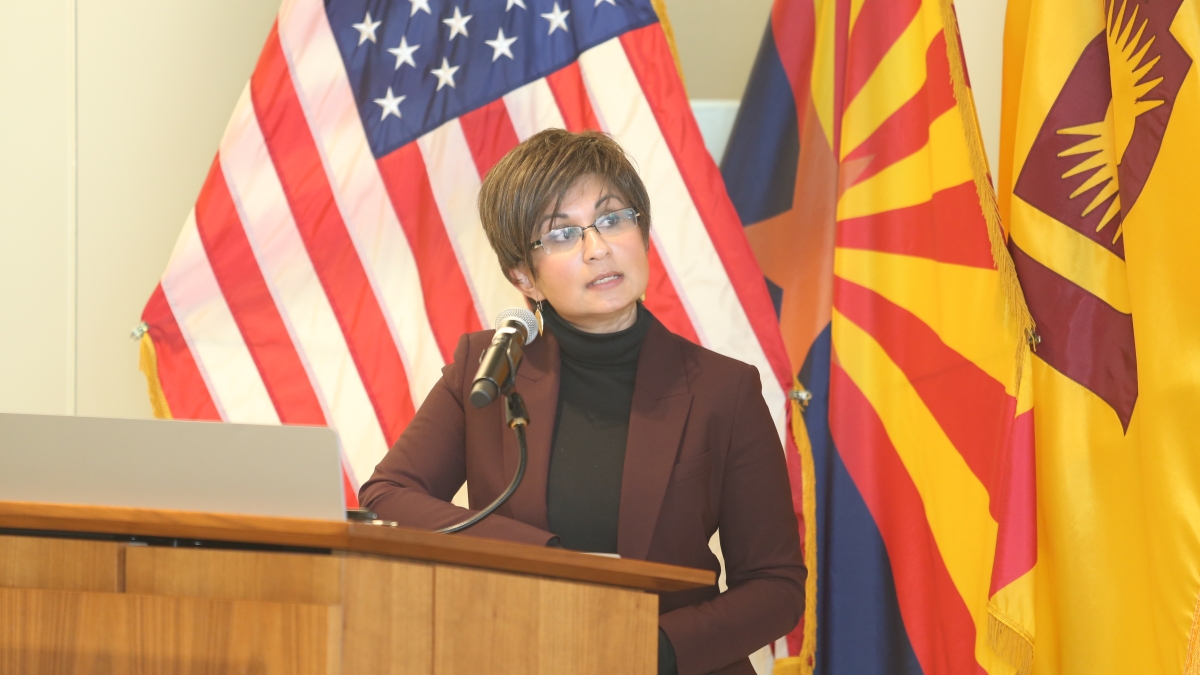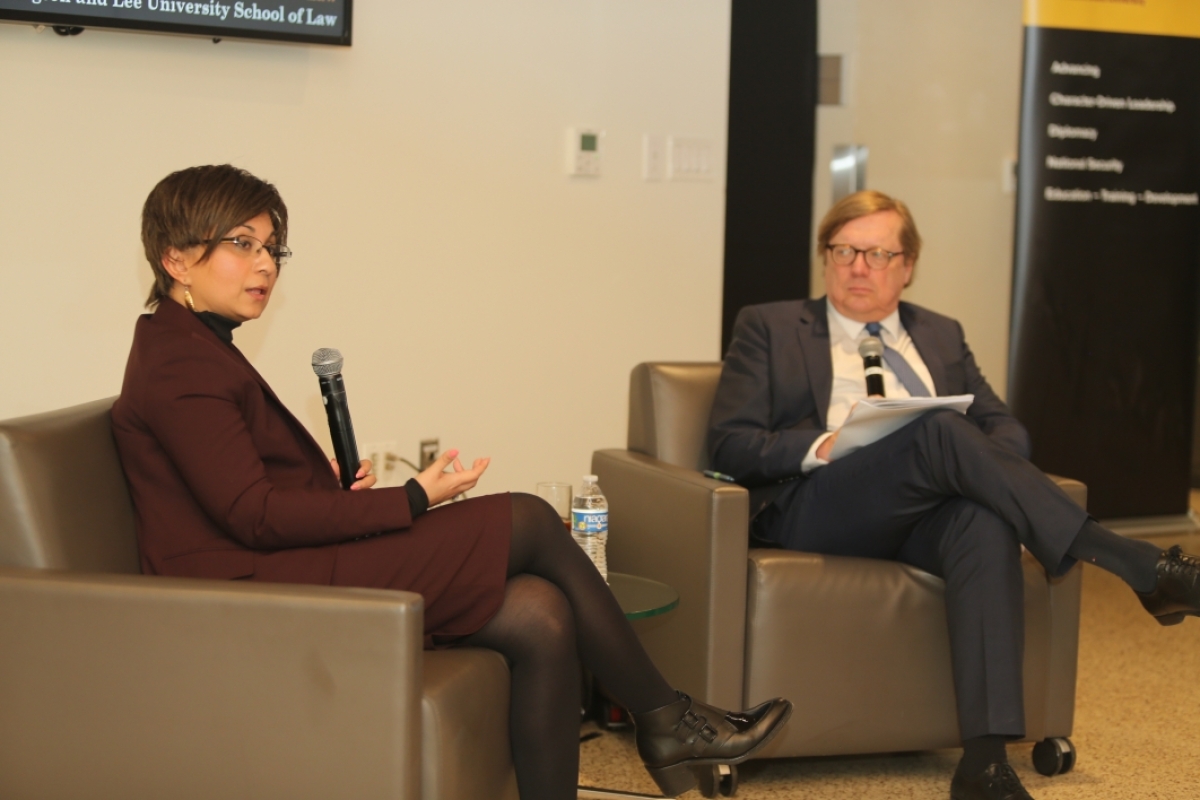Guest speaker discusses intersection of law and business in corporate foreign policy

Professor Kish Parella of Washington and Lee University School of Law discusses how corporations plot strategies in response to governmental policies, such as sanctions, to confront national security risks. Photo by Hager Sharp
On Nov. 28, the Leadership, Democracy and National Security Lab at the ASU Barrett and O’Connor Washington Center hosted a guest lecture event, Corporate Foreign Policy to Deter National Security Threats, with Professor Kish Parella of Washington and Lee University School of Law.
Her lecture examined how corporations plot strategies in response to government policies, such as sanctions, to confront national security risks — aptly described as the corporation's "foreign policy." These corporate foreign policies are business policies that use the traditional tools of national foreign policy to influence a government’s conduct toward another government or international organization, and, with foresight, that may extend beyond what governments require by law.
“Today, we have the expert about corporate foreign policy to address the subject to serve as the inaugural speaker in this series on modern deterrence strategy,” said David J. Scheffer, a professor of practice at ASU, who introduced Parella.
Parella focused on the transnational regulation of corporate conduct, with a particular focus on corporate human rights compliance in global supply chains. An expert on business and human rights, Parella teaches courses on ethics and law that include contracts and international arbitration.
Though related concepts, there are key differences between corporate social responsibility and corporate foreign policy, Parella explained. The mechanisms of foreign policy are “starting to crystalize in ways that mimic what we think of national foreign policy.” While corporate social responsibility targets consumers, employees and investors, Parella says the primary audiences for corporate foreign policy are either state or international government organizations (IGOs).
“I think the closest parallels to corporate foreign policy and national foreign policy come to things like declarations or statements issued by business leaders, prominently CEOs,” said Parella. “Those that (make) decisions to scale back or exit a country that sort of resembles private sanctions on a country by imposing some kind of cost on our economy and three-fourths of provision of humanitarian, either through monetary donations or donations of any kind.”
Parella shared how individual business decisions illustrate a broader phenomenon of corporate foreign policy and spoke about the invasion of Ukraine by Russia as a key example, a move in which Russian officials have warned constituents of the country’s direct involvement in the war. She further outlined three mechanisms as hundreds of companies around the world similarly sought to aid Ukraine to address the cost of coastline invasion:
- Numerous declarations that have been issued by CEOs and business leaders collectively, or individually.
- Provisions of humanitarian assistance that include monetary donations to aid organizations and in-kind donations of goods and services.
- Private economic sanctions: “overcompliance.”
“There seems to be a tenuous causal connection between the decision to leave all these companies. So there was a lot going on, and a part of what was going on is also the intention provided to companies that remain in Russia,” Parella said.
Parella also explained that the decisions that many corporations make are an intersection of two sets of factors, which she says are demand-side factors (e.g., government actors, consumers, media) and supply-side factors, such as the business model, international investment law and the organizational structure.
“It's tempting to ascribe different decisions to the fact that their sectors (have) different nationalities, certainly, but it's also interesting (that) a number of businesses ... share a lot of common features. They all share the same nationality. They all sell (the) same kinds of goods, they adopted a similar business model, made very different decisions when it came to Russia,” Parella said.
In fact, “we only get half the story” if we only look at the demand-side factors, rather than look at it as a whole.
“Who are the primary corporate stakeholders, and think about what are those preferences of those stakeholders when it comes to a particular issue?” Parella added. “Demand-side factors, I think, dominate so much in conversation when we think about why companies do what they do.”
Following the Russian invasion of Ukraine, many companies exponentially scaled back their operations. Parella argued that this is part of a broader conversation about this phenomenon called overcompliance, which she mentioned earlier, as companies may not know what sanctions are coming down the road and may be unclear about what it is.
“So maybe an exit is a logical option,” Parella said.
In a fireside chat following Parella’s lecture, Scheffer asked how privatized foreign policy can serve as a deterrence to illegal conduct by a nation, such as Russia’s invasion.
“I think adversity is presented through their actions as recognizing the unlawfulness of what Russia (did) and through all three actions kind of making a statement and acting on that statement, taking a stand,” Parella said. “Stakeholders can introduce, or suggest, or incentivize, structural change at a company that might be more challenging.”
She cited the United Nations Guiding Principles on Business and Human Rights (UNGPs), a set of guidelines for states and companies to prevent, address and remedy human rights abuses committed in business operations.
“By embedding these international guidelines into oversight, supply chain contracts (and) risk management,” Parella added, “a company is operating in a way more consistent with international law, which not only makes it a good part of international legal order to encourage international law compliance, but also hopefully ensures that that company itself is not liable.”
To watch the full guest lecture, visit ASU’s Leadership, Democracy and National Security Lab YouTube page.
More Law, journalism and politics

New online certificate prepares grad students for complex challenges of US democracy
If United States politics in the 2020s have revealed anything so far, it’s that the U.S. has a complex history with ramifications…

Reporting live from Paris: ASU journalism students to cover Olympic Games
To hear the word Paris is to think of picnics at the base of the Eiffel Tower, long afternoons spent in the Louvre and boat rides…

Exploring the intersection of law and technology
Editor's note: This expert Q&A is part of our “AI is everywhere ... now what?” special project exploring the potential (and…

